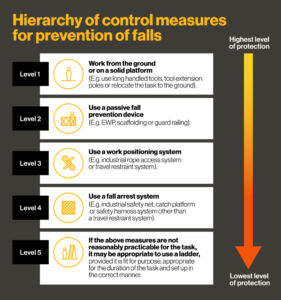Are you ok up there? Working from heights
Mar 25, 2024

The reality is unsafe work at heights can have devastating consequences. Falls from heights are one of the leading causes of fatalities and injuries in the construction industry within Australia. Preventing falls should be actively managed so that people working at heights are kept safe.
Plan Ahead: Before you start a job, figure out what could go wrong
Identifying a task that could lead to a fall is the first step to keeping people safe. Before commencing, put in place the highest level of protection possible to prevent falls.
Consider how long the job will take: The duration of the job will impact how you select the level of protection. If the job is ongoing, the structures chosen need to remain stable throughout the job. You may need to reassess things like ladders and scaffolds throughout the job.
Use hierarchy of controls to prevent falls
The hierarchy of controls outlines the various controls in order from the highest level of protection to the lowest level of protection. Select the safest, most appropriate control measure from the below hierarchy to prevent injuries or fatalities from falls from heights on your site.
Work on the ground or solid construction
If you can avoid working at height it should be your first option and is always the safest option. Some examples of eliminating the fall risk include using long-handled tools, relocating the task to the ground, and using extension poles for tools.
Use fall-prevention measures
If working from a height is necessary, you need to manage the risk of a fall. Fall prevention measures could be something like an elevated work platform, scaffolding, or guard railing.
Use a work positioning system
Check if a work positioning system like a travel restraint system can be used. A travel restraint system enables a person to work in a way that prevents the person from falling e.g. fixed-length lanyards and static line systems
Use a fall arrest system
Check if a fall arrest system like an industrial safety net, a catch platform or safety harness can be used. This system doesn’t prevent the fall but arrests the fall so you don’t come into contact with the ground e.g. shock absorber on lanyard or anchor point.
Ladder use
It may be appropriate to use a ladder. Ladders do not provide fall protection and as such should only be looked at as a last option when selecting the level of protection. Ladders should only be used for short duration works such as changing a light bulb or paint touch-ups.
Below is a great image from WorkSafe Victoria which has summarised the hierarchy of control measures for the prevention of falls. Click on the image below to view
Important: Where high-risk construction work includes a risk of a person falling more than 2 metres (3 metres in South Australia), a safe work method statement (SWMS) must be developed prior to work commencing.
Need more information?
Seek professional assistance
Working at height can often be high risk and there are experts who make it their job to complete this work safely. It is often safer and more cost-effective to use height specialists even for shorter jobs.
Make sure everyone knows what to do
Give your workers all the info they need to stay safe.. Conduct toolbox talks and remind them the importance of procedures and completing a SWMS (when required). Encourage them to watch out for each other and speak up if something doesn’t seem right.
Consistency is key
It’s important you and your team are actively involved in ensuring any heights related work is carried out in the safest way possible.
Resources
There are various WorkSafe / SafeWork websites, resources, and support tools on managing the risk of falls. Some examples include:
- Safe Work Australia Code of Practice – Managing the risk of falls at workplace
- WorkSafe QLD – Code of Practice – Managing the risk of falls at workplaces
- WorkSafe Victoria – Fall Prevention
- SafeWork NSW – Work safely at heights in construction
Need Help?
If you’ve got a question about working at height or any other health and safety matter, the HazardCo Advisory Team is here to help. Give them a call on 1800 954 702.















